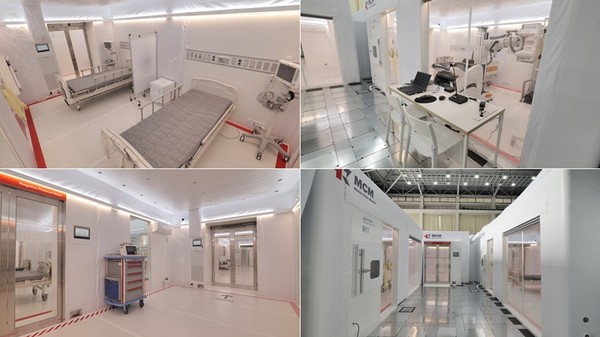The Mobile Clinic Module (MCM) developed by KARE (KAIST Action for Respiratory Epidemic) has begun operating as a special life treatment center in Gyeonggi-do. MCM is a negative pressure isolation ward equipped with medical facilities such as a central control system that can monitor and manage automatic opening and closing of the rooms, negative pressure, and ventilation conditions. This module has been developed since July 2020 by a research team led by Professor Taek Jin Nam from the Department of Industrial Design as part of a Korean quarantine package technology development project.

In September, the Gyeonggi Human Resources Development Institute opened a special residential treatment center that consists of 14 rooms with 28 beds (one room for two people) and one multipurpose room for X-ray scanning. MCM has been operating as a short-term treatment center for patients who had been through self-quarantine. Patients that have severe symptoms during self-quarantine for COVID and are considered to require medical care are hospitalized in the MCM for one to three days until appropriate follow-up measures can be taken. MCM’s medical apparatuses such as oxygen therapy, X-ray scanning, IV injection, and face-to-face diagnosis enable immediate medical action. If the patients show severe abnormal symptoms in the MCM, they will be transferred to a hospital; otherwise, they will be transferred back to a self-isolation facility.
Gyeonggi Provincial Medical Center Anseong Hospital is in charge of the operation of the special residential treatment center. One to two doctors, three nurses, two nursing assistants, one administration worker, and about 20 other personnel including KAIST researchers, police officers and firefighters work at the site. It runs from September 13 to October 10, and Gyeonggi-do plans to adjust the operating period as necessary based on COVID-19 situation and the overall month’s operation performance.
Choong-Sik Bae, the director of this operation project, said that MCM has become a groundbreaking and successful case of commercialization after a short trial operation of about a year. Although the Korean quarantine system has been suffering from a shortage of negative-pressure rooms, the wide usage of the MCM operation project may contribute to solving this problem.
In this regard, KARE is playing a role in transferring and commercializing technologies based on excellent research results from the KAIST researchers. It also aims to reinforce the quarantine package model based on science and technology.

